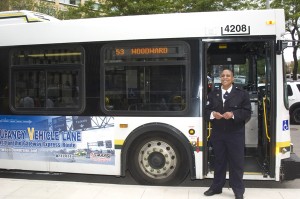For years, advocates and legislators have grappled with the question of sufficiently funding our transportation system without undue burden on taxpayers.
Late on November 3, the Michigan Legislature passed a “Roads Funding” package of bills which the Governor has said he will sign into law. Unfortunately, the package does little to fund transportation, certainly not sufficiently, and threatens other critical state priorities in the process. It was the least they could do, the very least.
There are a few silver linings of positives in the package:
- It will provide Michigan’s transit agencies roughly $60 million a year, starting in 2017. This is through a 7.3 cent/gallon increase in the gas tax, an 11.3 cent increase in the diesel tax, and a 20% increase in vehicle registration fees that will all go through the traditional funding formula that provides 10% to buses, trains, trails, and other non-road infrastructure. Unfortunately transit only receives 5% of the overall funding.

DDOT and SMART could each receive around an additional $10 million a year under this package. - The gas tax will be indexed to inflation starting in 2022, enabling at least some increase in transportation revenue over time.
- The bill would allow the City of Detroit to use up to 20% of the transportation funds it receives from the state for public transit, instead of the normal 8-10%.
- It will provide some needed funding for road repair, although at great cost.

However, the package has some major black clouds of flaws:
- The package directs future legislatures to reallocate $600 million per year (starting in 2020) from the general fund without specifying where the funds will come from. An expanded tax credit in the package will cost another $200 million per year.
Democratic Leader Tim Greimel, D-Auburn Hills, blasted it as “a mockery of policy” that “pretends to fix the roads” while delaying needed repair revenue and putting future state money for schools, public safety and health care at risk by creating a budget squeeze.
- As the Free Press noted, “Here’s the real kicker: Because half of the funding generated by this deal relies on general-fund cuts, which aren’t defined, haven’t been made, and might be hard to fully realize, this train wreck of a bill doesn’t even answer the problem it’s supposed to solve: how to generate $1.2 billion to fix our roads.“
As Sen. Curtis Hertel, D-East Lansing, said. “You are once again just kicking the can further down the crumbling road. . . . Raising taxes to keep the roads exactly as they are — poorly maintained and riddled with potholes. By 2021, when this bill is fully implemented, 50 percent of the roads will already be in poor condition.”